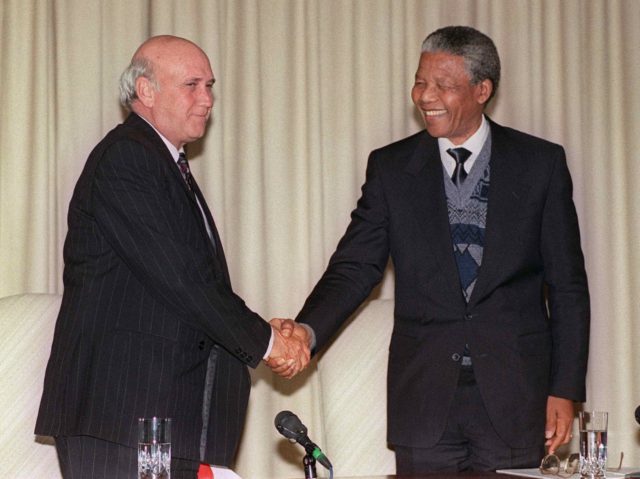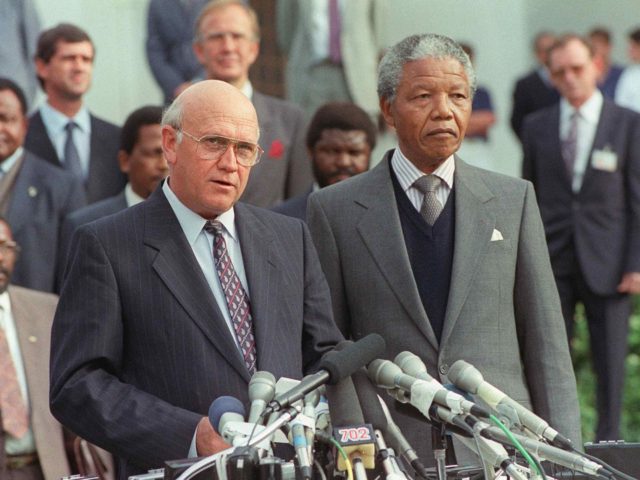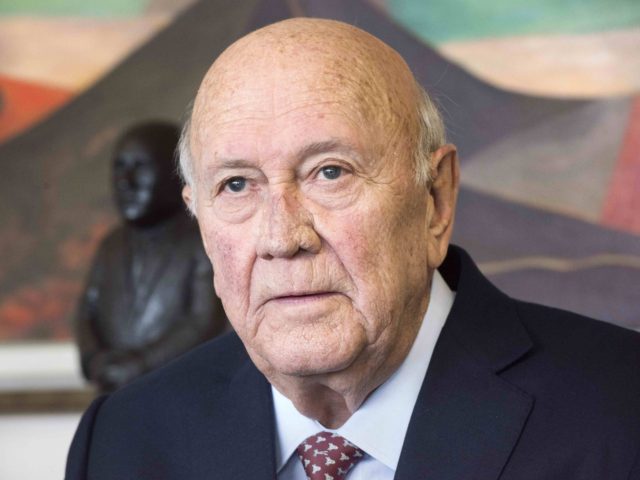Former South African president Frederik Willem (F.W.) de Klerk passed away Thursday at the age of 85 in Cape Town after a battle with mesothelioma.
He shared the Nobel Prize for Peace with Nelson Mandela in 1993 for the dramatic steps he took to end the apartheid regime and begin negotiations that led to South Africa’s first democratic elections in 1994.

South African president Frederik W. de Klerk (L) and anti-apartheid leader and African National Congress (ANC) member Nelson Mandela (R), smile and shake hands after at a joint press conference, 07 August 1990 in Pretoria, following a marathon meeting between South African governement and ANC, in which ANC agreed to suspend its 29 years of armed struggle. (Photo by ALEXANDER JOE / AFP) (Photo by ALEXANDER JOE/AFP via Getty Images)
His path from nationalist apparatchik to groundbreaking reformer and peacemaker remains one of the most extraordinary changes in contemporary political history.
In another stunning, parting gesture, De Klerk left a video message to be released after his death, in which he apologized for the pain caused by the apartheid system to millions of South Africans.
“Allow me in this last message to share with you the fact that since the early 80’s, my views have changed completely. It was as if I had a conversion and in my hearts of hearts realised that apartheid was wrong. I realised that we have arrived at a place which was morally unjustifiable,” he declared.
WATCH: I apologise for pain, hurt, indignity of apartheid – De Klerk's final message https://t.co/3QUGKJaNxV pic.twitter.com/MQM7whVklk
— Jacaranda News (@JacaNews) November 11, 2021
De Klerk was born near Johannesburg into an Afrikaner family in 1936, descended from the French Huguenots who sought refuge in the Cape, then under Dutch control, in the 17th century.
He pursued a legal career and joined the National Party, which had come to power in 1948 and which created the apartheid system, which both formalized and expanded existing racial segregation laws in South Africa. Apartheid also repressed civil liberties, such as freedom of assembly and the press.
For much of his career, De Klerk was seen as a conservative apparatchik, albeit a particularly skilled and ambitious one. He became president in 1989 after his predecessor, P.W. Botha, suffered a stroke.
Few South Africans expected much change from De Klerk. But the regime had conducted secret negotiations with an imprisoned Mandela since the mid-1980s, and the fall of the Berlin Wall in 1989 meant the Soviet sponsors of the African National Congress (ANC) were no longer a threat.
When he took the podium in Parliament on February 2, 1990, for the annual address at the opening of the legislative session, De Klerk stunned the world by announcing the imminent release of Mandela. He also announced that the ANC and other anti-apartheid organizations would be legalized.
The gesture led to euphoria — and chaos — and Mandela led the ANC into negotiations with De Klerk and the National Party toward the creation of a new, and non-racial, constitutional democracy.

South Africa’s President Frederik Willem de Klerk (L) and anti-apartheid leader and African National Congress (ANC) member Nelson Mandela addresses the media during a joint press briefing, after historic “talks about talks” between the South African government and the ANC in Cape Town. (Photo by WALTER DHLADHLA / AFP FILES / AFP) (Photo by WALTER DHLADHLA/AFP FILES/AFP via Getty Images)
Before reaching a final deal, De Klerk submitted his reforms to a referendum among white voters, who approved the talks by a two-to-one margin. However, the terms of the final settlement were more favorable to the ANC than to the National Party, as the new Constitution only included weak protections for racial minority groups. Many Afrikaners felt that De Klerk had abandoned them — while many black South Africans still held him responsible for violent acts condoned by the regime.
De Klerk joined the Mandela government as deputy president, serving alongside future president Thabo Mbeki as a gesture of national unity. But he would later leave the government of national unity over serious policy disagreements with the ANC.
He tried to return to the opposition, but his “New National Party” struggled to adjust to a fully democratic era, and the upstart liberal Democratic Party (now the Democratic Alliance) surpassed De Klerk’s party as the country’s official opposition.
In a shocking turn of events that highlighted South Africa’s continuing struggles with violent crime, De Klerk’s first wife, Marike Willemse, was murdered in her home in 2001. A security guard was convicted of her murder, and sentenced to life in prison.
In retirement, De Klerk established a foundation, which promoted democratic governance and a culture of human rights in South Africa’s fledgling democracy. He remained outspoken in his criticisms of the ANC, and continues to be controversial, though he is remembered fondly by many around the globe.
Without his courage, South Africa would likely have descended into civil war, and the redemptive process of turning racial oppression into multiracial democracy would not have happened.
Former South African opposition leader Tony Leon, who once battled with De Klerk in Parliament, offered this tribute (“Totsiens” means “goodbye” in Afrikaans):
Farewell FW de Klerk. Like Mikhail Gorbachev he reformed the system he inherited in 1990. And if he had not relinquished power in 1994, likely SA would be Syria or Venezuela today. Totsiens
— Tony Leon (@TonyLeonSA) November 11, 2021
He is survived by his second wife, Elita Georgiades, his children, Jan and Susan; and his grandchildren.
Joel B. Pollak is Senior Editor-at-Large at Breitbart News and the host of Breitbart News Sunday on Sirius XM Patriot on Sunday evenings from 7 p.m. to 10 p.m. ET (4 p.m. to 7 p.m. PT). He is the author of the recent e-book, Neither Free nor Fair: The 2020 U.S. Presidential Election. His recent book, RED NOVEMBER, tells the story of the 2020 Democratic presidential primary from a conservative perspective. He is a winner of the 2018 Robert Novak Journalism Alumni Fellowship. Follow him on Twitter at @joelpollak.

COMMENTS
Please let us know if you're having issues with commenting.